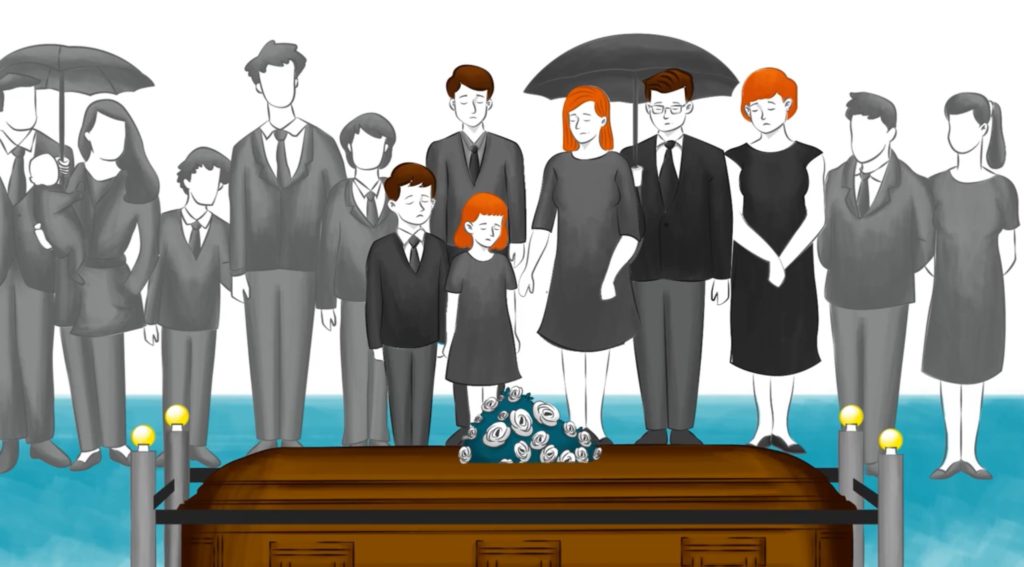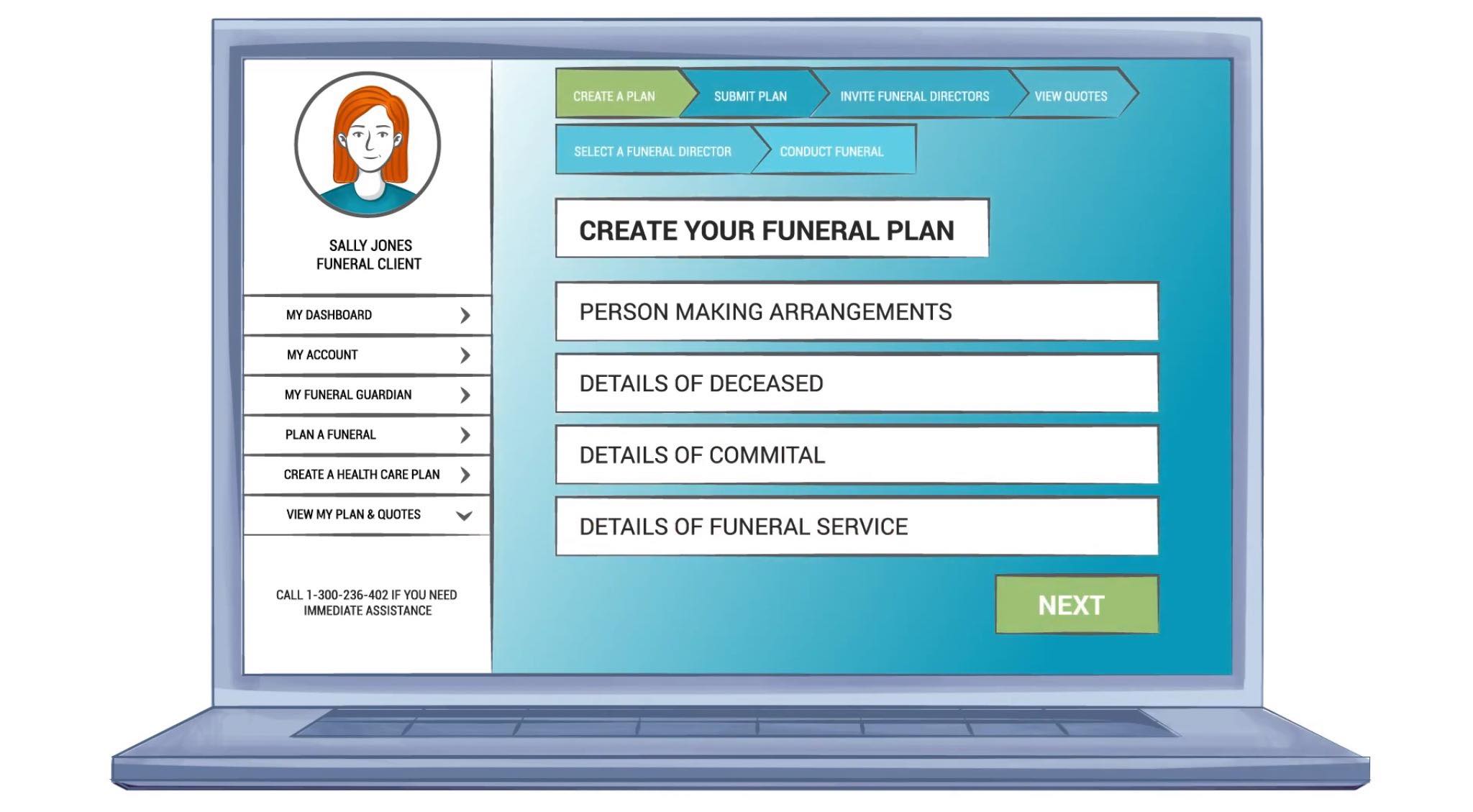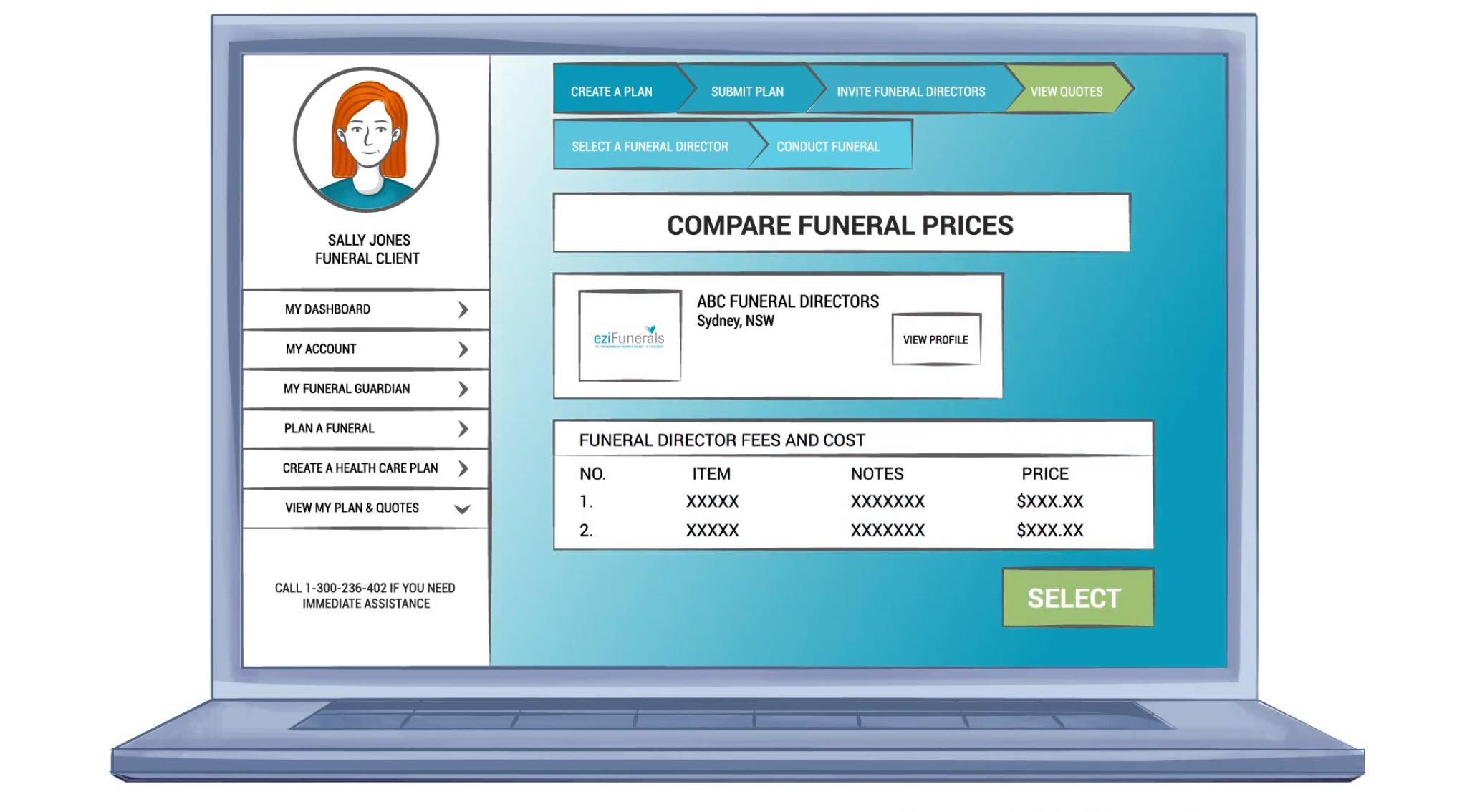DO YOU NEED A FUNERAL?
People need time to mourn the loss of family and friends. A funeral service fills this need and provides people with an important place to share in their grief and help the living say goodbye. Grief is hard, sometimes unbearable, but certainly doesn’t go away if we try to deny it happens.
A funeral:
- Offers finality and understanding that loved ones have died – the task of arranging the funeral, attending the viewing, planning the ceremony, giving a eulogy all help to counter reactions like the fog of numbness and disbelief.
- Allows us to show our feelings in a safe place – they spell out messages that say grief is normal, you don’t have to be brave, there’s no shame in tears.
- Provides an opportunity to acknowledge the life of a loved one and for family and friends to support each other in their grief.

GET AN ESTIMATE OF FUNERAL COSTS
WHAT HAPPENS WHEN SOMEONE DIES
Whether a death occurs at home, in hospital or in a public place, the first person who should be contacted is generally the person’s doctor. A doctor must certify that death has occurred.
Normally funeral arrangements cannot be completed until the doctor has signed and issued a Death Certificate. The Funeral Director can then take the deceased into their care.
In Australia the great majority of deaths occur in hospital or other care facilities, in which case those authorities take care of the medical formalities.
In certain instances it may not be legally possible for the doctor to issue a Death Certificate and there is necessity for police and coronial involvement. We would advise that you contact the relevant authorities for full details as regulations do vary from state to state.
THE ROLE OF FUNERAL DIRECTORS
The role of a funeral director is to provide a very special service and ensure the wishes of the family and the deceased are filled. A funeral director advises on and arranges all the details that make up a funeral service. Many of these items will be included as part of the funeral director’s professional service fee. The responsibilities of a funeral director include:
- Arrange all matters requested by the family taking into consideration the legal, social, cultural and religious considerations relating to the deceased and to the mourners.
- Transportation of the deceased from the place of death to the mortuary.
- Preparation of the deceased
- Collation of certificates from hospital or doctor’s surgery
- Completion of statutory requirements
- Preparation and insertion of newspaper notices
- Contact with clergy or funeral celebrant
- Organise bookings at the venue, church, cemetery and/or crematorium
- Officially register the death
- Obtain copies of the death certificate
- Organise all details of the funeral service, including the supply of vehicles and pall bearers
- Advise on religious and ceremonial requirements in relation to the funeral service and to visitation and other customs prior to, during and after the funeral.

GET AN ESTIMATE OF FUNERAL COSTS
MAKING FUNERAL ARRANGEMENTS
The funeral arrangement is the initial meeting you have with the funeral director and can be at their offices or in your home, whichever you prefer. In most instances, the Next of Kin is responsible for arranging the funeral of the deceased, for example: spouse, child, parent, legal partner or sibling.
In the instance of dispute, where it is known a Will exists, the arbiter of arrangements is deemed to be the nominated Executor. The Executor may in his/her discretion appoint a person to make necessary arrangements with a Funeral Director. Such occasions however, are infrequent and most arrangements are made by the Next of Kin.
In some cases authorities in institutions where a person may not have any known relatives may need to make necessary arrangements. This is usually done by the Social Worker or another authorised officer.
WHAT ABOUT THE FUNERAL SERVICE
A funeral service is for those who are living. It is a celebration and thanksgiving of the life of the loved one who has died.
The funeral experience is a key part of the grieving process which offers hope to the living and helps us on the road to recovery from our loss.
If this is the first time that you are arranging a funeral, the task can be quite daunting. The funeral director is there to guide and advise you on the many matters which need to be considered and to be entrusted with all the arrangements as directed by you.
A funeral service can be religious or secular, and can take place in one of several venues. Decisions will need to be made regarding matters such as:
- When and where you would like the funeral to be held
- The type of service you require
- Details about the viewing of the deceased
- If burial or cremation will follow the service
- Which coffin or casket and clothing you want for the deceased
- Who you would like to be involved
- What floral arrangements, music and motor vehicles would be appropriate and any other relevant matters.

GET AN ESTIMATE OF FUNERAL COSTS
DO WE NEED A VIEWING
Apart from the legal requirements in certain states and territories for the family to identify the body in the coffin before cremation can take place or in the instance of a coronial reported death, the viewing experience, and allowing enough time for everyone to take part, helps us in many ways.
In a general sense, otherwise there is not an obligation to view, however, the therapeutic benefits of a viewing to the grieving process are well regarded and recommended. It is nonetheless a matter of personal choice and requires sensitivity in approach, the physical environment and setting. Provided explanations are given to children in language that they can understand, there is no reason why they should not have the opportunity to be involved – however, allow them to decide.
A viewing gives loved ones the opportunity to see and spend time with the deceased prior to the funeral. In some cultures it may also occur during the funeral.
It helps us acknowledge that death has occurred and to confirm that the person has died really is the person in the coffin. It helps us come to terms with the reality and finality of death.
We can see that the one who has died is now at peace, especially if they were struggling or suffering in life. It provides everyone with the chance to express personal thoughts, to talk to the deceased and maybe just hold their hand, to finish off any ‘unfinished business’.
WHAT ABOUT EMBALMING
Essentially, Embalming is the process of replacing bodily fluids with chemical fluids for the purposes of:
- Preservation of the body
- Infection control.
- Enhancing the presentation of the deceased.
Embalming can be minimal or unnecessary in some instances; partial for the benefit of families wishing to ‘view’ and/or when the funeral may be within a week; or full embalming as may be expected in some cultures or when the body is to be repatriated interstate or overseas.

GET AN ESTIMATE OF FUNERAL COSTS
HOW MUCH DO FUNERALS COST
The obvious and understandable question, like building a house – the answer could be almost limitless. There are certain necessary inclusions and certifications required, some of which have fixed costs, some of which are negotiable. The concept of cremation being much less in cost than burial may not always be the case if the family already have a licence/lease for a grave which has allowed provision for further interments, in which case reopening and digging fees would apply.
As a guide the cost of a funeral can be categorised under three main areas:
- Professional service fees which incorporates all the tasks and services involved in arranging, planning and conducting a funeral including legal requirements.
- Disbursements which are the costs a funeral director pays for on your behalf for services offered by a third party such as flowers, catering, newspaper notices, etc.
- Coffin or casket choice.
WHY DO FUNERALS COST SO MUCH
The costs of organising and conducting a funeral depend on many factors including the range of activities the funeral home undertakes for the consumer, and the consumer’s requirements and preferences for the funeral. Funeral homes typically undertake some or all of the following tasks when arranging and conducting a funeral:
- collect, transport and care for the body, including embalming if requested
- supply a coffin or casket
- organise cremation or organise purchase of a burial plot and arrange for burial
- arrange the venue, date and time of a funeral service, and a celebrant to undertake it
- arrange floral tributes, newspaper notices, funeral stationery, audio-visual presentations
- complete registration of death and other legal paperwork.

GET AN ESTIMATE OF FUNERAL COSTS
Frequently Asked Questions
Why should I choose an eziFunerals Member Funeral Director?
eziFunerals Members are independent and family owned. They work for you and not the shareholders of the big funeral chains.
When does the Coroner become involved?
If the doctor is unable to certify the cause of death it is necessary to contact the police, who then will liaise with coronial staff. This will be necessary in such instances as:
- death other than by natural causes, including violence, accidental or unusual causes
- death whilst under anesthetic (or within 24 hours of the administration of an anesthetic)
- unexpected death
- death of a person in an institution, a prison or in police custody, drug or alcohol rehabilitation centre, and
- when the cause of death is unknown.
Coronial staff or a Government appointed Funeral Director will transfer the deceased to the Coroner. A post mortem examination, also know as an autopsy, is a detailed examination externally, and of internal organs, to establish the cause of death. This examination is conducted by a doctor known as a pathologist. An approach to a Funeral Director of your choice should be made as soon as possible. The Funeral Director will then liaise with coronial staff regarding release of the deceased into their care.
What happens if a death occurs interstate or overseas?
A Funeral Director should be notified immediately. They should be able to arrange for the transport of the deceased and attend to any statutory or customs requirements. In these circumstances there is usually an additional fee for the transportation of the deceased.
Who is responsible for arranging a Funeral?
In most instances, the Next of Kin is responsible for arranging the funeral of the deceased, for example: spouse, child, parent, legal partner or sibling.
In the instance of dispute, where it is known a Will exists, the arbiter of arrangements is deemed to be the nominated Executor. The Executor may in his/her discretion appoint a person to make necessary arrangements with a Funeral Director. Such occasions however, are infrequent and most arrangements are made by the Next of Kin.
In some cases authorities in institutions where a person may not have any known relatives may need to make necessary arrangements. This is usually done by the Social Worker or another authorised officer.
Which is more popular – Burial or Cremation?
The number of people in Australia choosing to be cremated is steadily increasing. Whilst there is some variance between states and territories, cremations now outnumber burials. Cremation funerals are much higher in city areas where crematory facilities are available. Rural and remote regions predominate in burials.
People have a choice of either burial or cremation. In certain cultures cremation is not favoured (or may be prohibited within the relevant faith belief). In other cultures the opposite may occur with cremation being the custom, for example, in the Hindu tradition.
Ultimately, this decision is a matter of personal choice. Future trends may see higher instances of cremation due to increasing limits on cemetery space within or convenient to population centres.
What information is required at the funeral arrangement?
You may need basic information about the deceased including full name, address, gender, occupation, place and date of death. Access to a Birth Certificate or Passport, and Marriage Certificate may be useful.
How much choice does the family have in funeral arrangements?
The family has absolute choice with certain exceptions as in the case of Coronial investigation in some murder cases, where permission may be given for a funeral by burial only.
A Funeral Director can volunteer options to a family but ultimately it is the family’s right to choose whatever they wish, providing necessary legal requirements are met. There may be some variation between states and territories within Australia, however, in most instances relevant Health Departments require the deceased to be placed in a coffin or casket for burial or cremation.
In the case of cremation the coffin or casket must be combustible.Again in certain states funerals may be Government assisted in the event of insufficient funds. Such funerals have limitations on choices. Advice, when necessary, should be given in the first instance by a Funeral Director, Social Worker or relevant Government Office.
Should children attend a funeral?
The death of a loved one affects everyone in the family, including the children. With a loving explanation of what it’s about and what will happen, they should be encouraged (though not forced) to share the funeral experience with the rest of the family and friends.
Children can gain comfort from taking part in the family’s mourning, knowing that they are included in the event and not left out because they are ‘too young to understand’. Children need to say goodbye too!
How much will a funeral cost?
The obvious and understandable question, like building a house – the answer could be almost limitless. There are certain necessary inclusions and certifications required, some of which have fixed costs, some of which are negotiable.
The concept of cremation being much less in cost than burial may not always be the case if the family already have a licence/lease for a grave which has allowed provision for further interments, in which case reopening and digging fees would apply.
A specific answer cannot be given to this question because of the scope of options available. The costs of a funeral are categorised under:
- professional service fees
- disbursements, i.e. the Funeral Director’s out of pocket expenses
- coffin or casket choice.
Can I arrange the funeral now and pay later?
Yes. When you lose a loved one, you shouldn’t have to worry about finding the money to pay for everything upfront. Our Buy Now Pay Later option allows for funeral payment plans up to $10,000. With terms of up to 36 months, funeral repayments are paid in fortnightly or monthly instalments allowing you to spread the cost of purchase over time.
What is embalming and when is it required?
Essentially, Embalming is the process of replacing bodily fluids with chemical fluids for the purposes of:
- preservation of the body
- infection control, and
- enhancing the presentation of the deceased.
Embalming can be minimal or unnecessary in some instances; partial for the benefit of families wishing to ‘view’ and/or when the funeral may be within a week; or full embalming as may be expected in some cultures or when the body is to be repatriated interstate or overseas.
Is a viewing necessary?
A viewing gives loved ones the opportunity to see and spend time with the deceased prior to the funeral. Again, in some cultures it may also occur during the funeral. An identification viewing is necessary in coronial reported details and occurs at the Coroner’s facility prior to funeral arrangements. In some states it is also obligatory for a person who knew the deceased to view and sign an official identification form which must be sighted and retained by the Crematorium authority prior to cremation.
In a general sense, otherwise there is not an obligation to view, however, the therapeutic benefits of a viewing to the grieving process are well regarded and recommended. It is nonetheless a matter of personal choice and requires sensitivity in approach, the physical environment and setting. Provided explanations are given to children in language that they can understand, there is no reason why they should not have the opportunity to be involved – however, allow them to decide.
What are the ashes and how will I receive them?
After the cremation process only the heavy bones of the deceased are left. They are granulated to provide the “Ashes”. Each Funeral Home/Crematorium will have a different process and it is best to discuss these details with your Funeral Director

About eziFunerals
eziFunerals supports individuals and families coping with end of life decisions, death and funerals. We are an independent, Australian-owned and operated company. We are not part of any other funeral company.
Our member Funeral Directors operate in Sydney, Melbourne, Brisbane, Perth, Adelaide and Australia wide. They are chosen for their knowledge, quality, service, personalisation and experience. They go above and beyond, and will take the time to support the family.
For more information or to make contact with a trusted Independent funeral director, call eziFunerals on 1300 236 402 or visit www.ezifunerals.com.au.




